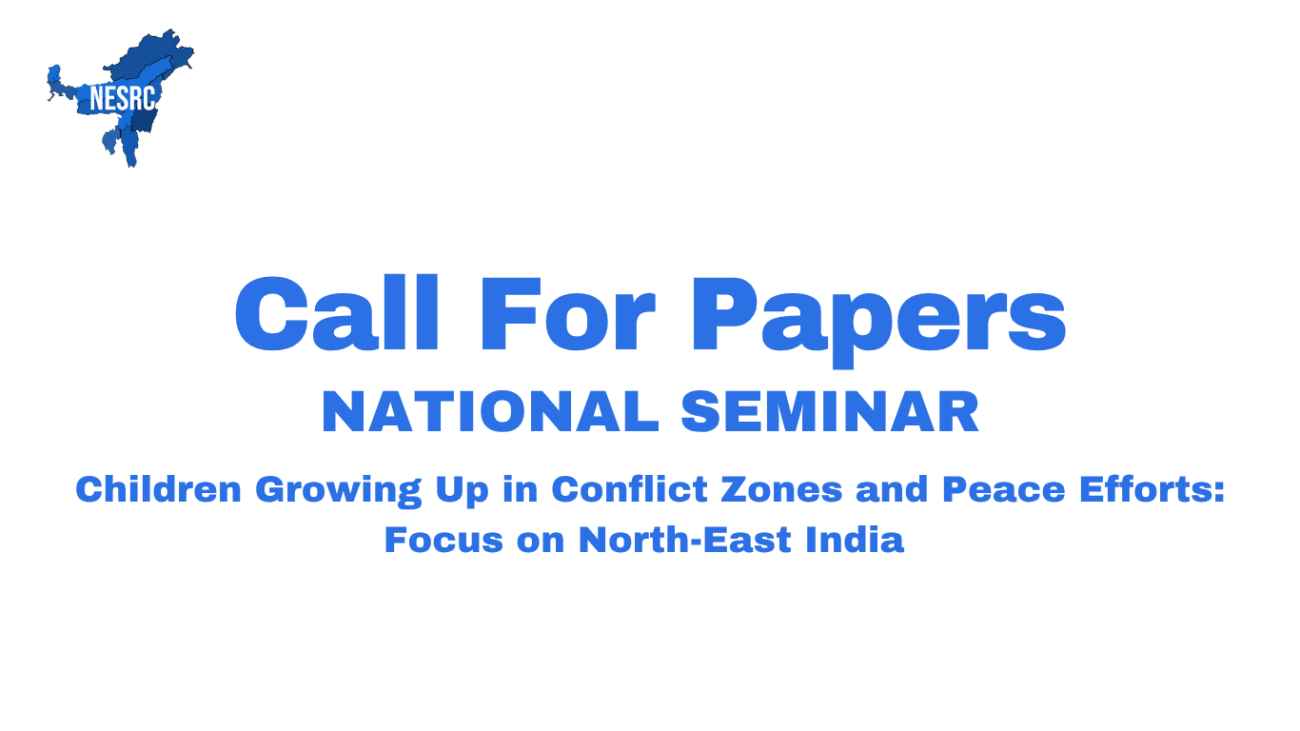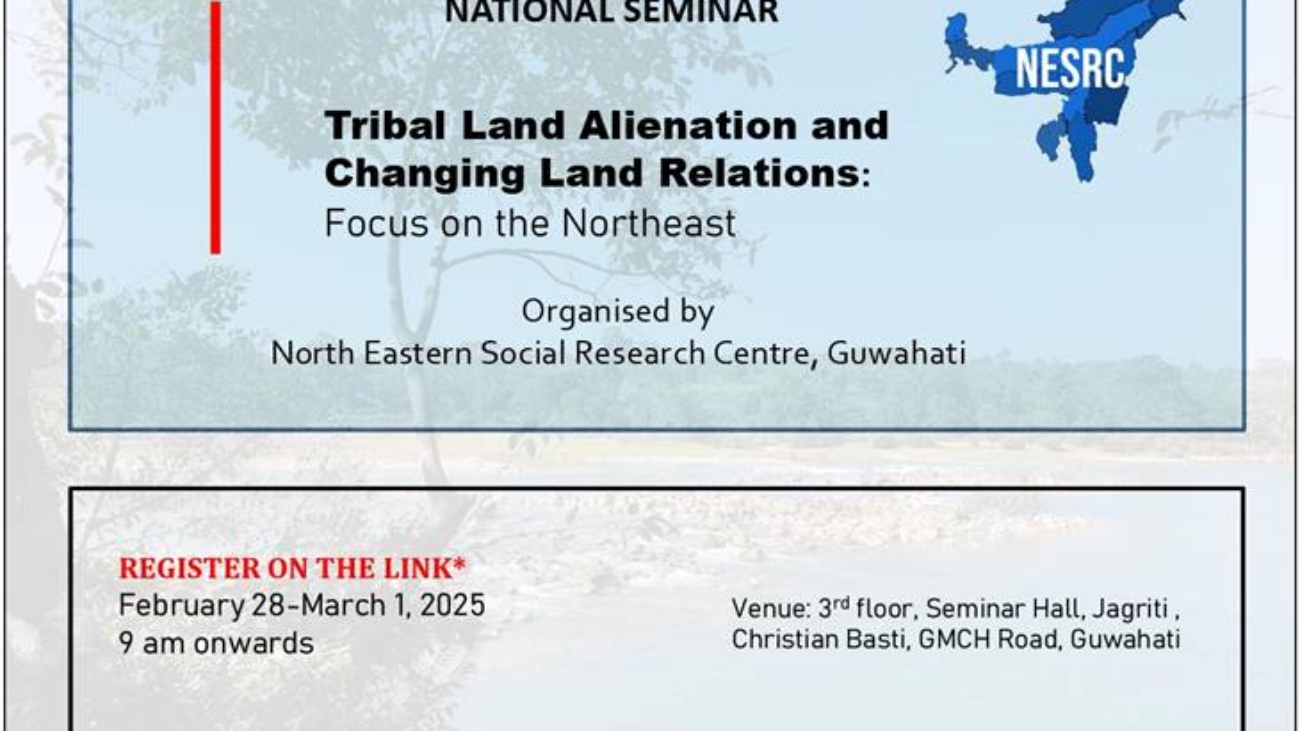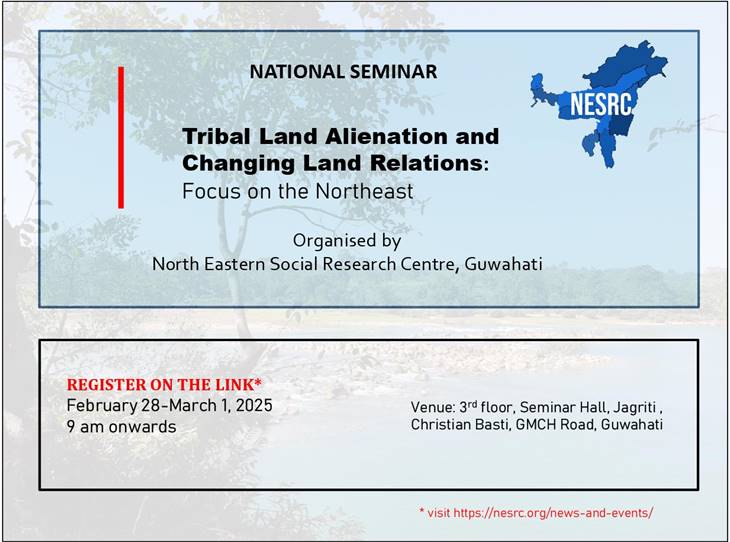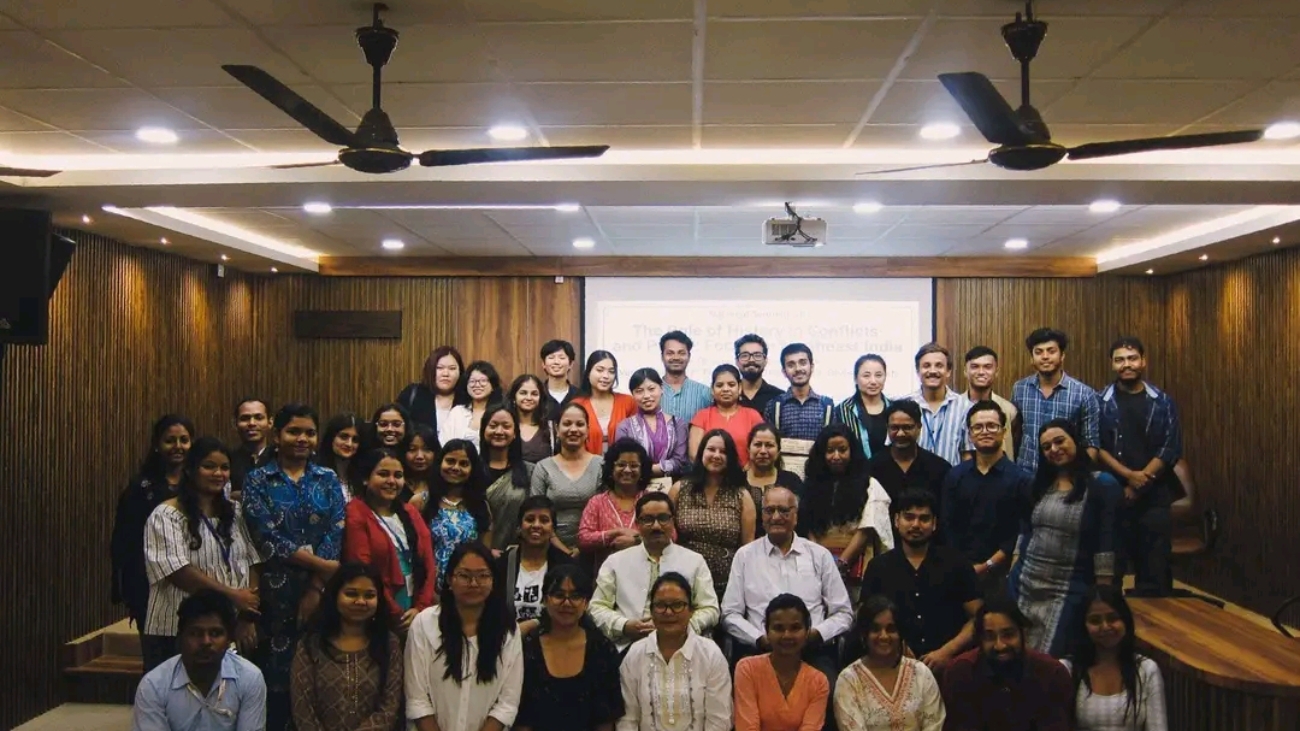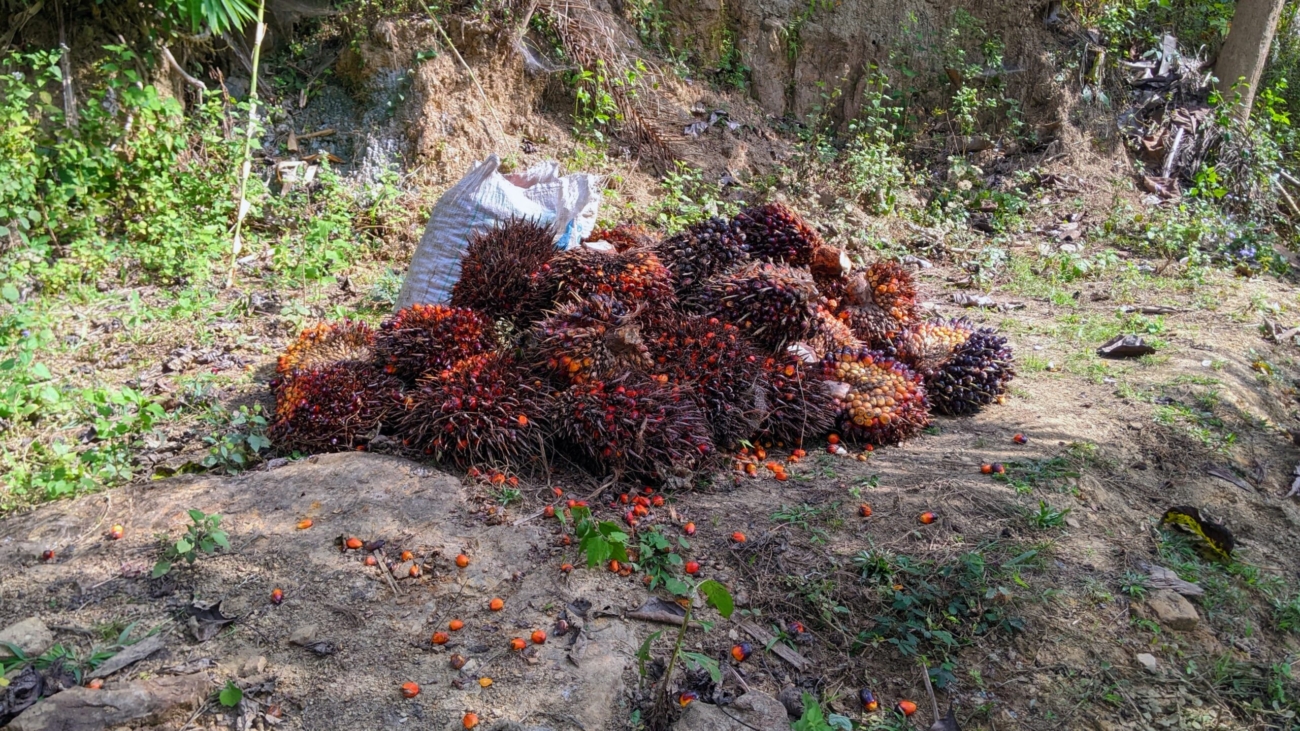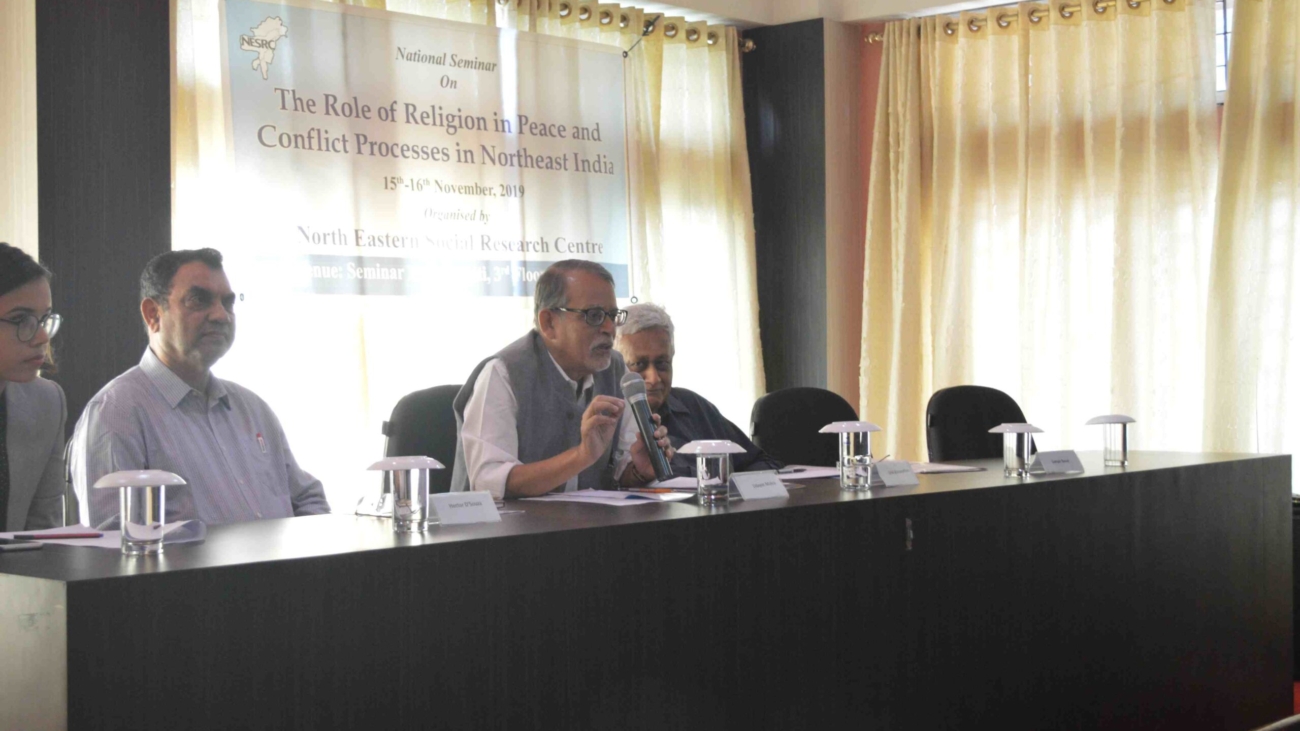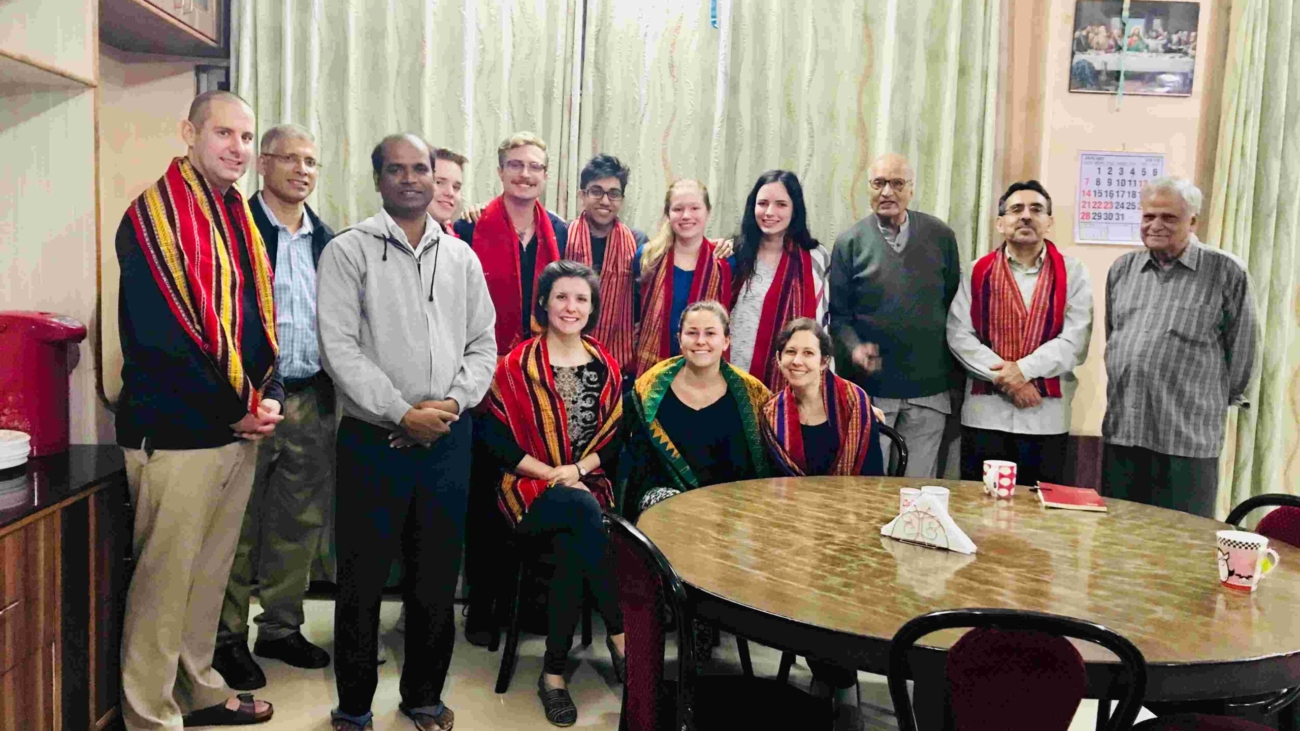September 19-20, 2025
Organised by North Eastern Social Research Centre (NESRC), Guwahati
Venue: Seminar Hall, Jagriti 3rd Floor, Christian Basti, GMCH Road, Guwahati 781005
Concept Note
Children in conflict zones are a critical subject of study and policy. Childhood as a concept is rooted in multidisciplinary and intersectional contexts. Childhood shapes children’s growth as future adults. The conceptualisation of childhood in conflict zones is much needed to formulate the meaning of child rights from a local, state, or regional perspective as it is required in peace efforts. As children become the subject, object, and instrument of violence (D’Costa, 2016, 2) in an increasingly challenging political world, the need arises to think about the impact of conflicts on children and the constraints they face growing up in a state of conflict. As we watch and read about wars and ethnic conflicts, children are being killed, orphaned, displaced, and forced to participate in conflicts and wars all over the world. It is becoming increasingly pertinent to discuss conflict and peace while recognising the all-round development of children growing up in conflict zones. This seminar aims to identify who these children who are growing up in conflict zones, especially focusing on Northeast India. It also seeks to understand how conflict affects children and the role of gender. Can children be political agents in conflict and peace efforts? If so, how do we seek to find a lasting solution? The seminar will explore different methods of peacebuilding practised and the type of care required to reintegrate children in distress due to conflict.
Children: The Context of North East India
Conflicts and peace efforts in North-East India (NEI) have a long, complex history, marked by an interplay between colonial legacy and post-independence dynamics. For instance, the colonial identification of the Northeast as a ‘buffer zone’ or ‘frontier’ led to tensions and skirmishes with the local people, and subsequently, India’s quest for national integration often clashed with the region’s aspirations for autonomy and an identity of its own. That resulted in decades of conflicts. Ethnicity is an important factor influencing the complex social and political relations in NEI (Barbora, 2002, 1285). The militarisation resulting from these dynamics and the identity-based politics that follow from it, have produced a cycle of violence, displacement, and instability, and have severely impacted the region’s developmental trajectory. Among the groups most affected by it, are children, who grow up amidst armed conflicts, forced migration, and trauma resulting from it. Their consequences are long-term and multifaceted, since they affect their education, mental health, physical well-being, and overall development. In this continuum from colonial neglect to post-independence securitisation, children remain one of the most vulnerable groups, bearing the brunt of a history marked by exclusion, violence, and systemic instability.
Children have also been drawn into the resistance movements throughout the history of NEI. In most cases they participate in them, in both passive and active statuses, for example as an extended part of their parents’, family and community with the larger idea of identity and belonging to their respective location. In NEI children have been part of the Assam Movement, the demand for Nagalim, the 1980s conflict in Tripura, (McDuie-Ra, 2016, 46), conflicts in Manipur, and other ongoing conflicts. Because they are drawn into the conflict not always with their consent, they may be reduced to agency-less beings or used as weapons in violence, keeping in mind how sincere their voices are in conflict situations (McDuie-Ra, 2016, 55). Scholars and activists, therefore, question their role as political agents in non-children’s issues like territorial autonomy, but they play a part in such movements. Does such participation become an instrument in violent conflicts, or do children become more serious in their quest to be political agents or change-makers?
Civil society groups have promoted child rights within the development discourse, and have contributed to knowledge and guidelines for children’s well-being. Working in the interface of children and social welfare, child rights advocates have located child labour, marriage, sexual abuse, juvenile justice, etc, for mass mobilisation of these voices. Children have participated in these movements as well, for example Bachpan Bachao Andolan (Save the Childhood Movement). But in NEI, such mobilisation against children in the conflict areas or the exploitation of their human rights has not attracted the kind of attention it should have received. Thus, to question whether dominant voices, if they have not been successful in advocating for children in conflict zones, have caused a lag at a national level, brings us to the point on the role of local bodies in the region in mobilising and advocating for their children in need of care and rehabilitation. Can we use some cases in the local scenario where small local bodies or organisations have stepped up in providing care and rehabilitation to children to organise and advocate for child rights in conflict situations? What kind of aspirations can be acquired from such local groups? And, in what ways can children’s voices be included in these peace processes for dialogue?
While growing children run several risks to their healthy development, the risk of violent conflict, which affects children differently, ranges from the risk of physical and emotional to moral, and spiritual abuse (Anandaraj, 2007, 1-2). Children are often caught between the politics of inclusion and exclusion, with little or no say in the matter. They view conflict in a particular manner, usually from a position of extreme vulnerability (Pereira et al., 2016, 5). Further, their right to live with dignity, to access education, and to move freely is hampered intensely. As conflicts are patriarchal in nature, gendered vulnerabilities increase. In all these aspects, girls and boys experience violent conflicts in different intensities, in ways that cannot be used interrelatedly. It is, therefore, important to look at the role of children in conflict from a gender perspective too.
When discussing reintegrating care and rehabilitation in post-conflict settings, it is important to recognise that children need sustained care, both generally and especially in the aftermath of a conflict. Families and homes are typically the first sources of emotional and physical support to children, with schools playing a vital secondary role. However, when homes and schools are destroyed, abandoned, or displaced due to conflict, the question arises: who then provides such essential care? This includes emotional support, protection, education, and basic needs. The situation becomes even more urgent for children who are orphaned, criminalised during a conflict, or forced into child labour to support their families. How are these children reintegrated into society? What legal and institutional provisions are in place to protect their rights, ensure their rehabilitation, and support their long-term development?
The role of and impact on children in conflicts and peace-making is not limited to the Northeast. With proper modifications, what is said above about children in Northeast India is also true for the rest of India, and in a different manner for the rest of South Asia too. So, during this national seminar, one may also reflect on a few cases from the rest of India, especially around conversation for research on issues affecting children in Peninsular as well as Northeast India.
Conclusion
The seminar on the impact of conflicts on children in the country as a whole and NEI in particular seeks to bring together scholars, activists, mental health professionals, community leaders, and policy makers to explore these multidisciplinary and intersectional dynamics. Children in the North-East is a topic which is gaining importance with time, and has a long journey to make in producing work on the reintegration and rehabilitation of children surviving conflicts. For it to happen, the experiences of children in conflict and peacebuilding need to be delved into deeply. It is a critical moment in the history of collective peace-building studies, so scholars and peace activists need to pay attention to these situations of conflict, and produce research around children growing up in conflict zones around the world, in Peninsular India, and in Northeast India.
References
Anandaraj, Hannnah. Children At Risk. Hyderabad, Neelkamal Publications PVT. LTD., 2007.
Barbora, Sanjay. “Ethnic Politics and Land Use: Genesis of Conflicts in India’s North-East.” Economic & Political Weekly, vol. Vol. 37, No. 13, no. Mar. 30 – Apr. 5, 2002, 2002, pp. 1285-1292 (8 pages), https://www.jstor.org/stable/i399779.
D’Costa, B. (2016). ‘Turtles Can Fly’ : Various Terror and the Child in South Asia. In Children and Violence: Politics of Conflict in South Asia (pp. 1-43). Cambridge University Press.
McDuie-Ra, D. (2016). Children and Civil Society in South Asia: Subjects, Participants, and Political Agents. In Children and Violence: Politics of Conflict in South Asia (pp. 46-61). Cambridge University Press.
Pereira, M., Rodrigues, S., & Gupta, A. (2016). Growing Up In Conflict Zone: Children Surviving Conflict In Tripura (Vol. NESRC Peace Series – 7). North Eastern Social Research Centre.
Technical Sessions of the National Seminar on: Children Growing Up in Conflict Zones and Peace Efforts: Focus on North-East India
Technical Session I: Children in Conflict Areas: Theories and Narratives
To explain theory and practice as the starting point of the seminar, this section sets the context for understanding the meaning of children, ethnic conflicts, political violence, social exclusion and inclusion, exploitation, marginalisation, and vulnerabilities in the study of children in conflict. This section can include embodied experiences of children, which can be written as stories and narratives from memories, archives, and documentation of conflict struggles that an individual or group, or community has lived through, and is continuing to bargain with its impact.
Technical Session II: Role of Gender and Social Location in Conflicts
This section can be used to take a look at the patriarchal nature of conflicts, and to address intersectionality and gender-based violence as part of these conflicts. For example, girls are more often victims of gender-based violence in conflict, while boys suffer the consequences of what is perceived in a masculine manner, such as direct participation in armed conflicts. In what ways can gendered vulnerabilities be identified in children belonging to double marginality, one as children from a gender, caste, race, and ethnic identity, and the second as children affected by conflict?
Technical Session: III: Psycho-Social and Socio-Spatial Needs of Children in Conflict
Children have their own complexities of growing up and being part of a wider social phenomenon of conflict. This section is divided into two sets of concepts that are to be used to detect distress in children growing up in conflict situations. One way is to address the psycho-social needs, such as providing mental and physical health services to children affected by violent conflict, for example, children physically hurt or disabled during conflicts, and are emotionally scarred due to distressful memories of violent conflicts. Second, socio-spatial requirements such as playgrounds, neighbourhoods, environment, etc., where children interact with their peers and nature, are constrained through conflicting situations. After their homes, schools, and localities are tragically burned down, occupied, or made to be relief camps, their sense of belonging is hampered equally. This section can use a detailed analysis of distress in childhood using these two lenses.
Technical Session IV: Educational Concerns During Conflicts
Schools and playgrounds play a crucial role in children’s growth, yet in prolonged conflict areas, access to education becomes a major challenge. This leads to concerns about the quality of education, disrupted schooling, and increased dropout rates. During conflicts, schools often face the risk of closure, and in many instances, are burned down, destroyed, or rendered permanently non-functional with damage to infrastructure and resources. Children suffer psychologically, emotionally, and economically. It makes going back to school a stressful act in the aftermath of a conflict. This challenges the constitutional provision on the right to education for all, and results in an imbalance of children’s access to education. Further, economic scarcity makes children drop out of school to meet the needs of sustaining themselves in such a situation. In what ways are children in the region forced to bargain to access education post-conflict? Is the psychological, emotional and economic impact of conflict undermined when they begin to study again?
Technical Session V: Children in Resistance Movements and Media Coverage of Children in Conflict Zones
This section can include the history of resistance movements where children participated for the collective good of their society. These political struggles should be written from a point of reference, keeping in mind how these resistance movements were shaped by their participation, what challenges these children had to face, and how sincere these involvements were. This section can also include the role of civil society bodies, local groups, and militant organisations in mobilising children to participate in non-children’s issues, for example: children recruited as child soldiers, children’s involvement in territorial issues, etc. The media has played a monumental role in shaping or making situations worse for many. Today, we are no longer dependent on print media; there are a multitude of options available for people to grab information from. The second part can be elaborated on the role of media coverage and representation of children and youth in these conflict zones. Are these reports biased based on gender, race, ethnicity, and other prejudices dividing the children from the Northeast to Peninsular India?
Technical Session VI: Rehabilitation and Reintegration, Peace Efforts, and Peace Education Policies
This session focuses on the urgent need for reintegration and rehabilitative frameworks within peace processes, particularly in the context of children affected by conflicts. In many conflict-affected areas, especially in the North-East, a growing number of children face displacement, orphanhood, and are forced into child labour to support themselves and their families. These post-conflict realities raise critical questions about the role of state institutions, legal frameworks, and civil society in ensuring the rehabilitation and reintegration of such children. How can legal and institutional mechanisms support the restoration of children into society? In what ways does child labour, both during and after conflict, represent a severe violation of children’s rights, and how can it be addressed within peacebuilding frameworks? What preventive and care-oriented measures are currently being implemented, and how effective are they? This session also explores the integration of peace education into care and school curricula, including the potential of peace clubs and other pedagogical tools to foster resilience, conflict resolution skills, and community healing among children. Further, it will examine the contributions of civil society and local community groups in peace efforts, with a particular focus on successful initiatives and models emerging from the North-East region
|
Instructions for abstract submission: Submit your abstract at: seminar.nesrc@gmail.com For any queries, write to: Tejaswinee Hazarika (tehazaika@gmail.com) |
|
Note: |
You Tube link of the above seminar



